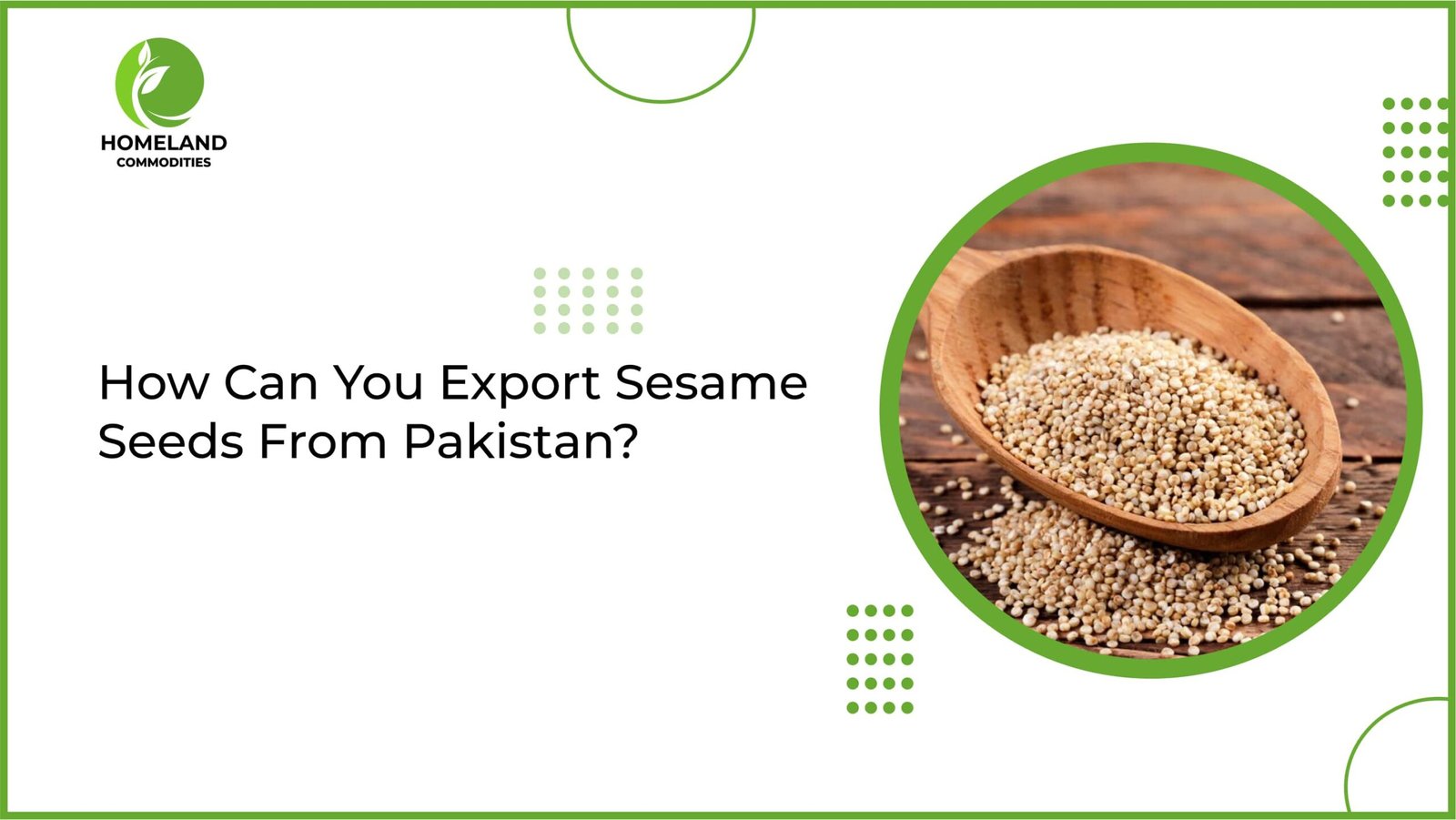Sesame seeds, known locally as “Til,” are an economically valuable commodity for Pakistan. As a top global producer, Pakistan benefits from favorable climatic conditions and fertile soil, particularly in Sindh and Punjab. Given the increasing international demand for these nutrient-rich seeds, exporting sesame seeds from Pakistan represents a significant business opportunity. This guide thoroughly examines each step involved in the export process, from market analysis to logistics and buyer engagement.
1. Understanding the Sesame Seed Market
Global Demand and Market Trends
Sesame seeds are highly valued for their versatility and health benefits, driving their demand across various global markets:
- Europe: European countries such as Germany, France, and the Netherlands are prominent consumers of sesame seeds. In these regions, sesame seeds are integral to bakery products, snacks, and health foods. For instance, sesame seeds are used in making breadsticks, crackers, and energy bars.
- Middle East: The Middle East is a significant market where sesame seeds are a staple in traditional cuisine. Countries like Lebanon, Turkey, and Saudi Arabia use sesame seeds in dishes such as hummus, tahini, and various desserts. The region’s demand is driven by both traditional culinary uses and the rising popularity of health foods.
- Asia: In Asia, countries like India, Japan, and China consume substantial amounts of sesame seeds. India uses sesame seeds in traditional sweets like tilgul and various spice blends. Japan and China incorporate sesame seeds into a range of dishes from sushi to soups and salads.
Pricing Trends and Market Research
Prices of sesame seeds can fluctuate based on several factors:
- Supply and Demand: Monitor global production levels and supply chain disruptions that may affect prices. For example, a poor harvest in major producing countries like Sudan or Tanzania can drive up prices globally.
- Production Levels: Track production trends in key countries to understand how they influence global prices. For instance, an increase in production in India or a significant yield increase in Ethiopia could impact market dynamics.
- Market Conditions: Economic factors, such as currency fluctuations and trade policies, can also affect pricing. Stay updated on global economic conditions and trade agreements that could influence sesame seed prices.
Conduct market research to identify target buyers, assess market needs, and understand pricing structures. Tools such as industry reports, market analysis platforms, and trade publications can provide valuable insights.
2. Identifying and Selecting Exporters
Key Exporters in Pakistan
Choosing a reliable exporter is crucial for successful sesame seed exports. Here are some notable exporters:
- Bhandari Foods: Known for its diverse range of sesame seeds, including white, black, and hulled varieties. Bhandari Foods has built a reputation for quality and timely delivery, serving a wide range of international markets.
- HAS Trading: Specializes in bulk shipments and has a strong global presence. Their extensive network and experience in handling large volumes make them a preferred choice for many buyers.
- M/S BALAJI COMMODITIES: Offers competitive pricing and focuses on high-quality sesame seeds. Their market reach extends to various international destinations, catering to different customer needs.
- COMTRAD: Provides a variety of sesame seed options with a strong emphasis on quality control. They are known for their efficient supply chain and commitment to meeting international standards.
- SAKHI INTERNATIONAL: Renowned for their expertise and adherence to international quality standards. They focus on maintaining high standards and delivering consistent quality.
- M/S KANWAL TRADING COMPANY (PRIVATE) LIMITED: Known for its robust supply chain and reliability. They offer a wide range of sesame seeds and are known for their consistent product quality.
- TOWER TRADING COMPANY: Provides efficient export solutions and is recognized for its reliability in delivering products on time.
- SIRAJ FAYYAZ TRADERS: A trusted exporter with a focus on customer satisfaction. They offer high-quality sesame seeds and prioritize excellent service.
- TESHA ENTERPRISE: Offers a variety of sesame seeds and serves different international markets. They are known for their flexibility and customer-focused approach.
Choosing the Right Exporter
When selecting an exporter, consider:
- Reputation: Look for exporters with positive feedback and a strong track record. Reviews, testimonials, and industry awards can provide insights into their reputation.
- Experience: Choose exporters with extensive experience in handling sesame seeds and navigating international markets. Their expertise can help in managing potential challenges.
- Compliance: Ensure the exporter complies with international standards and regulations. Verify their certifications and quality control processes.
- Customer Feedback: Reach out to other clients or industry contacts for their experiences with the exporter. This feedback can provide a clearer picture of their reliability and service quality.
3. Complying with Export Regulations
Export Documentation
Proper documentation is vital for smooth export operations:
Commercial Invoice
Essential for customs clearance and financial transactions. It should include:
- Invoice Number and Date: Unique identifiers for the transaction.
- Buyer and Seller Details: Names and addresses of both parties.
- Description of Goods: Detailed description of sesame seeds, including variety and grade.
- Quantity and Weight: Total quantity and weight of the shipment.
- Value and Terms of Sale: Price per unit and payment terms.
Packing List
Provides a detailed account of the shipment:
- Itemized List: Specific contents of each package.
- Weight and Quantity: Weight and quantity of items in each package.
- Markings and Labels: Special markings or labels on the packages.
Bill of Lading
Serves as a receipt and contract for transportation:
- Shipping Details: Vessel name, port of loading, and shipping date.
- Package Information: Weight, quantity, and markings of the packages.
- Terms and Conditions: Shipping terms and conditions are agreed upon.
Certificate of Origin
It was issued by the Chamber of Commerce or Trade Development Authority of Pakistan (TDAP) to verify the product’s origin.
Phyto-sanitary Certificate
Issued by the Plant Protection Department, certifying that the seeds are free from pests and diseases.
Quality Standards and Certifications
Ensure sesame seeds meet international quality standards:
- ISO Certification: Confirms adherence to quality management standards. This certification is essential for maintaining consistency and quality in exports.
- Organic Certification: Required for exporting organic sesame seeds. Obtain certification from recognized bodies such as USDA Organic or EU Organic.
- HACCP Certification: Ensures food safety management practices are in place. This certification is crucial for compliance with international food safety standards.
Customs Requirements
Familiarize yourself with Pakistan’s customs regulations:
- Duties and Taxes: Understand the applicable duties and taxes for sesame seed exports. Check with Pakistan Customs for the latest rates and regulations.
- Clearance Procedures: Follow procedures for clearing goods through customs, including submitting the necessary documents and complying with inspection requirements.
4. Packaging and Labeling
Packaging Materials and Methods
Effective packaging is essential to protect sesame seeds during transit:
- Jute Bags: Ideal for bulk shipments, offering ventilation and protection against moisture and pests. They are commonly used for large quantities of seeds.
- Plastic Bags: Suitable for smaller quantities and protect against moisture and contamination. They are often used in combination with inner liners.
- Vacuum-Sealed Packaging: Helps in maintaining freshness and extending shelf life. This method is beneficial for premium or specialty sesame seeds.
Labeling Requirements
Accurate labeling is crucial for compliance and customer information:
- Product Name: Clearly state “Sesame Seeds” and specify the variety if applicable (e.g., white, black).
- Net Weight: Indicate the weight of the product in both metric (kilograms) and imperial (pounds) units.
- Origin: Mention “Product of Pakistan” to indicate the source.
- Expiration Date: Include the expiration or best-before date to ensure freshness and compliance with import regulations.
- Nutritional Information: Provide details on nutritional content if required by the importing country’s regulations.
5. Logistics and Shipping
Transportation Options
Choose the most suitable transportation method based on factors like cost and speed:
- Sea Freight: Ideal for large shipments and offers cost-effective solutions for long-distance exports. Use this method for bulk orders and non-urgent shipments.
- Air Freight: Suitable for smaller or urgent shipments, though more expensive. Opt for air freight when speed is critical.
- Land Transportation: Used for neighboring countries or as part of a multi-modal transport plan. Land transportation is useful for regional markets.
Shipping Documentation
Ensure all shipping documents are accurate and complete:
- Bill of Lading: Acts as a receipt and contract for the transportation of goods. Ensure it includes detailed shipping information and terms.
- Export Declaration: Required by customs authorities, detailing the nature and value of the shipment. This document is crucial for customs clearance.
Insurance
Consider insurance to protect against potential losses or damages during transit. Insurance coverage can mitigate risks associated with shipping, including damage, loss, or theft.
6. Finding and Engaging Buyers
Trade Shows and Exhibitions
Participate in international trade shows and exhibitions to showcase your products:
- International Food & Beverage Exhibition: A platform for connecting with global buyers and industry professionals.
- World Food Fair: Offers opportunities to network and explore new markets.
Online Marketplaces
Leverage online platforms to reach a broader audience:
- Alibaba: A leading platform for connecting with international buyers and suppliers. List your products and engage with potential buyers.
- Global Sources: Provides a marketplace for various commodities, including sesame seeds. It helps in reaching global buyers and expanding market reach.
Networking and Industry Associations
Join industry associations and network with other professionals:
- Pakistan Oilseed Development Board: A key association for networking and industry insights. Membership can provide access to valuable resources and market information.
- Local Trade Associations: Engage with local trade associations for support, market trends, and business development opportunities.
7. Ensuring Compliance and Quality Control
Quality Control Processes
Implement rigorous quality control measures:
- Regular Inspections: Conduct inspections at different stages, including pre-harvest, post-harvest, and before shipment.
- Testing: Perform tests for contaminants such as pesticides, aflatoxins, and other quality parameters.
- Supplier Audits: Regularly audit suppliers to ensure they meet quality and safety standards. This helps in maintaining consistent product quality.
Regulatory Compliance
Stay informed about international regulations and ensure compliance:
- Stay Updated: Keep abreast of changes in international trade regulations, quality standards, and market requirements.
- Compliance Checks: Regularly review compliance with export regulations and quality standards to avoid potential issues.
Bottom Line
Exporting sesame seeds from Pakistan offers a significant opportunity due to high global demand and favorable local production conditions. By thoroughly understanding market dynamics, selecting reliable exporters, adhering to regulatory requirements, ensuring quality, and managing logistics effectively, you can successfully navigate the export process. With careful planning and execution, you can tap into global markets, drive business growth, and contribute to Pakistan’s economic development.


